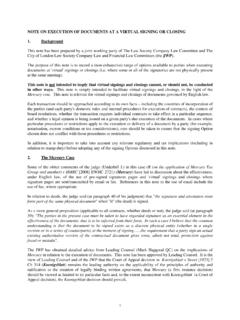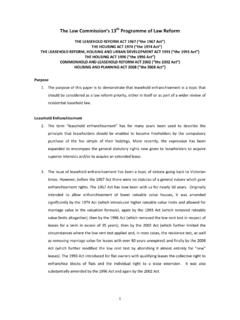Transcription of City of London Law Society Land Law Committee …
1 19579933-1 1 City of London Law Society Land Law Committee response to consultation on reforming the electronic Communications code Introduction The City of London Law Society ( CLLS ) represents approximately 15,000 City lawyers through individual and corporate membership including some of the largest international law firms in the world. These law firms advise a variety of clients from multinational companies and financial institutions to Government departments, often in relation to complex, multi-jurisdictional legal issues. The CLLS responds to a variety of consultations on issues of importance to its members through its 19 specialist committees.
2 This response in respect of the Department for Culture Media & Sport s Consultation Document reforming the electronic Communications code ( Consultation ) has been prepared by the CLLS Land Law Committee . Whilst we have not responded to the questions posed by the Consultation, we considered that it may be helpful to highlight our general thoughts on the Consultation and express a few concerns. General comments We consider that the proposed new electronic Communications code ( code ) is a huge improvement on the existing one. We believe that the code sets out the legal position of operators and landowners in clear terms and provides a more efficient and less confusing forum for dispute resolution.
3 The code does provide greater clarity in the relationship between both parties. We like the fact that the code is written in Plain English with sections often having headings in the form of a question. We consider that a reasonable balance has been struck between enabling operator rollout and maintenance of telecommunications services on the one hand, and protecting the property and human rights of landowners on the other. The code has been appropriately updated to support the rollout of modern communications technology. 19579933-1 2 The greater clarity in the code is more likely to reduce bureaucracy and legal and other costs.
4 Since we represent both landowners and operators, we will not be commenting on some of the more contentious areas such as valuation, although the Government acknowledges that operators under the new code are likely to pay out less for wayleaves. This is consistent with the Government s desire to encourage the rollout of modern infrastructure referred to below. We note the Government s acknowledgement that the overall impacts of the code benefit operators more than landowners and can understand the logic that operators are the focus of the Government proposal to reduce the barriers to infrastructure investment.
5 If the code s changes weakened operators negotiating position on balance, this would increase the costs of infrastructure and the provision of telecommunications services would not increase, and there may also be a consequential adverse impact on consumers. We do believe, however, that the protections for landowners under the new code have been clarified and strengthened in some ways. So although, ultimately, the new code may be seen as operator friendly, it is still reasonably balanced. code /1954 Act/1987 Act/2002 Act interaction A key problem with the current code is the awkward interaction between the code and Part 2 of the Landlord and Tenant Act 1954 in relation to seeking to recover possession of land.
6 We are pleased with the new code s treatment of the position, which we believe should alleviate most of the practical difficulties in obtaining possession caused by competing requirements in the Landlord and Tenant Act 1954 and the current code . It is also sensible to provide that the conferring of a code right is not a relevant disposal for purposes of tenants right of first refusal under the Landlord and Tenant Act 1987. This has caused problems in practice in terms of enabling tenants to veto landlords arrangements with code operators and the clarity in the new code that the 1987 Act will not apply is to be welcomed.
7 In terms of the changes to the Land Registration Act 2002, it is provided that a code right is an unregistered interest which overrides first registration or registered dispositions, as the case may be, except where the right is conferred by a lease. We consider that this is a logical treatment. If the code right is contained in the lease, the land registration rules as to registration of the lease in order to gain priority should apply, as is provided for in the new code . If the code right is not contained in a lease, it is sensible that it should be an interest with overriding status, thereby avoiding the need to determine whether the code right is an easement requiring registration or a wayleave.
8 Conferring of code rights In terms of the Court s power to impose an agreement on a landlord, we consider that it is fair to provide that an order may not be made if the court thinks that the relevant person intends to redevelop all or part of the land to which the code right would relate or any neighbouring land, and could not reasonably do so if the order were made. 19579933-1 3 Assignment/sharing/upgrading rights The wider rights for operators to assign, share or upgrade (including not having to pay for this) are clearly beneficial to operators, although this may in part be justified by avoiding adverse impact on services in the event of a merger or acquisition.
9 We note that there is some protection for landowners on sharing and upgrading apparatus where there is an impact (burden or visual) on the landowner. Continuation of code rights and bringing agreement to an end The provisions in the new code for continuation of code rights and bringing an agreement to an end are clearer than under the current code . If the landowner wishes to bring the agreement to an end, because they intend to redevelop all or part of the land to which the agreement relates or any neighbouring land, and could not reasonably do so unless the agreement comes to an end, this must be specified in the relevant notice to end the agreement.
10 If, ultimately, this ends up in court and the court decides that the landowner has established the redevelopment (or other) ground, the court must order that the agreement comes to an end. This appears to provide greater certainty for landowners who, for example, wish to redevelop, as compared to the current process under paragraph 20 or 21. Moving and Removing electronic Communications Apparatus While there has been some confusion with the current code concerning the interaction between paragraphs 20 and 21, paragraph 20 has proved to be very useful to landowners in terms of providing the right to lift and shift apparatus in the case of an improvement.










